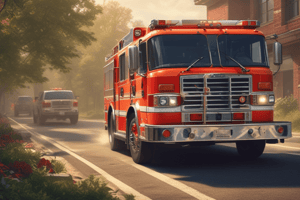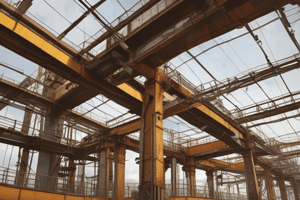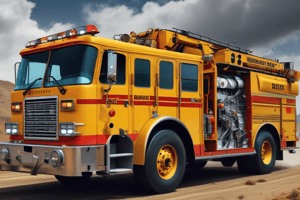Podcast
Questions and Answers
What is a Bag-Mask Device used for?
What is a Bag-Mask Device used for?
- To monitor heart rate
- To provide CPR compressions
- To check responsiveness
- To provide positive-pressure ventilation (correct)
What should a rescuer do after every set of 30 compressions during 2-rescuer BLS?
What should a rescuer do after every set of 30 compressions during 2-rescuer BLS?
Give 2 breaths
The first rescuer during 2-rescuer BLS is responsible for ______.
The first rescuer during 2-rescuer BLS is responsible for ______.
chest compressions
The second rescuer in a 2-rescuer BLS scenario is responsible for ______.
The second rescuer in a 2-rescuer BLS scenario is responsible for ______.
A Bag-Mask Device provides 21% oxygen when not attached to an oxygen flow.
A Bag-Mask Device provides 21% oxygen when not attached to an oxygen flow.
What is one critical characteristic of High-Quality CPR for adults?
What is one critical characteristic of High-Quality CPR for adults?
The second rescuer should lean on the chest after compressions.
The second rescuer should lean on the chest after compressions.
Flashcards are hidden until you start studying
Study Notes
Bag-Mask Device
- Utilized in 2-rescuer Basic Life Support (BLS) for providing positive-pressure ventilation.
- Comprises a bag connected to a face mask; may be self-inflating.
- Functions with or without an oxygen supply; delivers about 21% oxygen when not supplied.
- Some devices incorporate a one-way valve which can differ between models.
Critical Points of Using a Bag-Mask Device
- Operates similarly to a pocket mask.
- Administer 2 breaths after every 30 chest compressions.
- Each breath should last 1 second, providing enough volume for visible chest rise.
- Avoid over-ventilation to ensure effective breathing.
Roles for 2-Rescuer Adult BLS
- First rescuer: responsible for chest compressions, counts out loud, and delivers breaths.
- Second rescuer: activates the AED and attaches the pads.
2-Rescuer Adult BLS Sequence
- Step 1: Ensure scene safety.
- Step 2: Check the victim's responsiveness; if unresponsive, call for help. One rescuer remains with the victim while the other activates emergency response and gets the AED.
- Step 3: Assess for normal breathing and pulse. If normal breathing is present, monitor the victim. If no normal breathing but a pulse is present, provide rescue breathing.
- Step 4: Initiate CPR (30 compressions followed by 2 breaths) if the victim is not breathing and has no pulse. Use AED as soon as it's available.
- Step 5: When the AED arrives, assess the heart rhythm to determine if it is shockable.
High-Quality CPR: Adult
- Key characteristics include compressing the chest hard and fast at a rate of 100-120 compressions per minute with a depth of at least 2 inches.
- Ensure complete chest recoil after each compression; do not lean on the chest.
- Keep interruptions in compressions to less than 10 seconds.
- Deliver effective breaths that achieve chest rise while avoiding excessive ventilation.
Unlocked ESIM World
- Includes scenarios for Adult BLS in public and gym environments.
Adult BLS Parking Lot Scenario
- Specific context and procedures are designed for managing emergencies in parking lots.
Adult BLS Gym Scenario
- Tailored strategies and actions relevant to emergencies occurring in gyms.
Studying That Suits You
Use AI to generate personalized quizzes and flashcards to suit your learning preferences.




